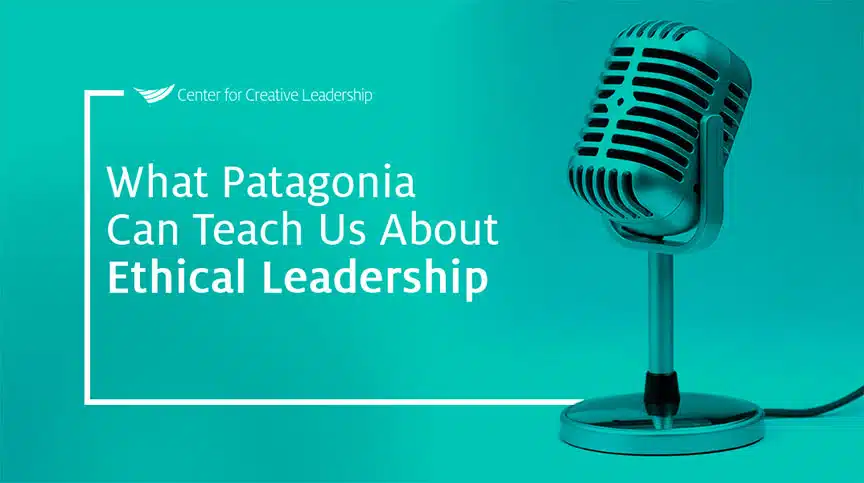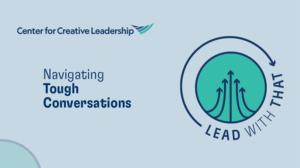- PODCAST
Lead With That: What Patagonia Can Teach Us About Ethical Leadership

“Earth is now our only stakeholder.” That was written by Yvon Chouinard on September 14th as Patagonia’s billionaire founder gave away his company to Mother Earth. Instead of selling Patagonia and taking the company public, Chouinard has given the $3 billion outdoor brand to a family trust and a not-for-profit called the Holdfast Collective. The goal with the creation of these entities is to put any profit not reinvested back into Patagonia towards fighting climate change, and at its best, it’ll look like something like a hundred million dollars a year donated directly to saving our planet.
Now, at a time when more and more billionaires are getting on board with “doing the right thing,” at first glance, this action might not seem extraordinary. But after digging in and investigating the differences between the sale of Patagonia in this instance, and the sale of so many other organizations, we see a difference here. In this episode of Lead With That, Allison and Ren talk about an organization’s role in doing the right thing, the kind of leaders it takes to do the right thing, some of the spaces in between, and lead with that.
Listen to the Podcast
In this episode Allison and Ren talk about an organization’s role in doing the right thing, the kind of leaders it takes to do the right thing, some of the spaces in between and lead with that.
Interview Transcript
INTRO:
Welcome back to CCL’s podcast, Lead With That, where we talk current events in pop culture to look at where leadership is happening and what’s happening with leadership.
Ren:
“Earth is now our only stakeholder.” That was written by Yvon Chouinard on September 14th as Patagonia’s billionaire founder gave away his company to Mother Earth. It’s actually a pretty cool video on Instagram if you haven’t seen it. Instead of selling Patagonia and taking the company public, Chouinard has given the 3 billion outdoor brand to a family trust and a not-for-profit called the Holdfast Collective. The goal with the creation of these entities is to put any profit not reinvested back into Patagonia towards fighting climate change, and at its best, it’ll look like something like a hundred million dollars a year donated directly to saving our planet.
Now, at a time when more and more billionaires are getting on board with “doing the right thing,” at first glance, this action might not seem extraordinary. But after digging in and investigating the differences between the sale of Patagonia in this instance, and the sale of so many other organizations, we see a difference here. Maybe this “dirtbag capitalist” has been walking the talk for decades and this is just his magnum opus. Either way, when the founder in the face of a $3 billion organization does something this drastic, we have to talk about it. And while Yvon Chouinard is an amazing character and will likely get his own episode one day, we’ll use his actions and some of his ethos as a lens to explore some bigger topics.
Today we’ll talk about an organization’s role in doing the right thing, talk about the kind of leaders that it takes to do the right thing, and some of the spaces in between. Welcome back, everyone. I’m Ren Washington, and as usual, I’m joined with Allison Barr. Allison, does a leader have an inherent responsibility to society?
Allison:
So Ren, we start our podcast in the same way, right? You intro and you ask me a question.
Ren:
Yeah.
Allison:
It’s fall. What do you say we shake it up a bit, and you can answer your own question first?
Ren:
I have to go first?
Allison:
Yeah.
Ren:
Is that just an autumn thing?
Allison:
We’re living in some strange times right now, so I’m just honoring the uncertainty that we’re living in.
Ren:
Does a leader have an inherent responsibility to society? I don’t know if there’s inherent responsibility to society at large in leadership, so no.
Allison:
Okay. I want to read something to you that might be familiar.
Ren:
All right.
Allison:
So humor me here. So: our mission is to advance the understanding practice and development of leadership for the benefit of society worldwide. Simply put, we strive to make the world a better place through more effective leadership. What do you think about that?
Ren:
I think an organization like that probably has some very stellar podcast hosts that work for them, but that sounds interesting. Now, I don’t know if I hear inherent responsibility in there, but I imagine-
Allison:
Benefit of society.
Ren:
Uh-huh. The benefit of society. I agree that leadership might benefit society, but is there inherent responsibility in leadership to benefit society? Question mark. I’m not sure. Just so we’re clear, what was that you read?
Allison:
That would be the one and only mission statement from the Center for Creative Leadership.
Ren:
Just where we work.
Allison:
And I bring that up in jest, right? Because you’re right, there’s maybe some gray in there. What does benefit mean? We could get really granular. And when you and I were talking last week about this specific podcast, I immediately thought, “Well, yes, of course they do.” And my thoughts are that a company, an organization, is an entity that exists within society. And so an organization is not its own sovereign nation. So it exists within the society that you and I live and the rest of human beings live. So there’s an impact to an organization existing in society just as much as the stream in my backyard has an impact. A different impact. But the same people that you work with also exist in the society in which you live. And so most organizations do have an impact on society. You mentioned this in the intro a little bit. They have an impact on the society. They have an impact on the environment, standards of living, and so on and so forth. So it would be a yes for me, an implied yes. And I think… Well, curious what your response is.
Ren:
Yeah. And I know eventually we’ll maybe get back to Yvon and what he did with Patagonia, but I don’t know if there’s an implied responsibility. There’s some interesting frames there when we think about leadership and the role of an individual that participates in a society. I think that’s a really interesting idea. You, I, people in our organization, they engage in society. They have to follow the rules of the culture they inhabit. But when I look at organizations, some of them, I don’t know if they operate in society. Sometimes I think they operate parallel to it or even outside of it.
I mean, why is this such a marvel? Companies don’t often say, “You know what I’m going to do? I’m here to help the society in which I operate.” Leaders don’t often say that, so much so that when this guy does something like this, people are like, “No possible way. Why would he do that? That doesn’t make any sense.” So the inherent responsibility is probably what I’m poking at that. And maybe to the means of, if we think it’s inherent, then we might just wait for leaders to, air quoting our favorite thing here, “do the right thing.” But maybe people are looking around, like, “I don’t know, is my responsibility to society or is my responsibility to the people who’ve signed my check?”
Allison:
So the thing with talking about organizations is that an entity is a piece of paper. An organization is run by human beings, period. And so if you go into the 4 walls of an organization… Well, some of us are not even going into the 4 walls of an organization anymore, but if we’re operating for an organization, then why would a company have a mission statement that oftentimes, more oftentimes than not, the mission statement and the values are directed towards society at large.
And so I think what Patagonia has always done well is that they challenge the assumptions that most people have about the workplace. And so we could get into the nuances of being in a capitalist environment, because that’s a fact: we’re in a capitalist environment. Capitalism inherently thrives with competition, accumulation of capital, signing checks, if you will, profit… However, Patagonia, since conception, has always aimed to be a sustainable organization and is a really great example of what it means to operate with the company values as a priority versus operating with a priority to profit. And you highlighted in the intro that they are a profitable company. So it’s a win-win, so why would you not?
Ren:
And they may be one of the few examples who have been as steadily committed to returning back to the world in which they live. I think you point to organization’s mission statements and I point to them, and I think about the people that I’ve worked with and the people that I’ve come across in my life, and I don’t know how many of them could read to me right now their mission statement by heart. I think about some organizations that have a really, really fantastic performative mission statement but functionally operate in the globe that enables them to operate as the globe does. And so again, and maybe we’ll start to expand on this more, sometimes I don’t know if I can depend on people to do things other than what they’re motivated or rewarded to do.
I was just reading this article, and this gentleman named Ted Clark, Executive Director of the Northeastern University Center for Family Businesses, and he was reflecting on this situation, saying what makes capitalism so successful is that there’s motivation to succeed. And he was saying this in reflection to part of the family trust in this Holdfast Collective is that Chouinard and people like him are stepping away from making the business profitable to keep the business alive. And Clark’s suggestion, he continues to say: if you take all the financial incentives away, the family will have essentially no more interest in it except the longing for the good old days.
Now I think Ted, what he’s saying is people are not interested in the wellbeing of others unless it benefits themselves. And I think I’m inclined to agree with him. Again, Chouinard is an example of this. I don’t know if we remember the space race between the billionaires earlier this summer, but they could have fed countless people. Instead they were like, “You know what? I’m going to see the curvature of the Earth, baby.”
Allison:
Oh absolutely. I couldn’t agree more. And what’s interesting is you’re getting me to think about how company culture is developed, and you talked about that a little bit too. And when we talk about culture, which we often do at CCL, one thing I think that people neglect to consider is that the external culture of the organization will inform the organization’s culture.
So the United States, for example, if we’re just talking about the US right now, the US is an individualist culture. That’s not right, wrong or bad, but it’s one of the most individualist cultures in the world. So this means that the majority of human beings in the United States focus on I versus we, and they focus on the needs of themselves versus the needs of the “we,” the community, the society, et cetera. And there are of course benefits and opportunities to this type of culture, but I think what we’re seeing is perhaps this going to the extreme.
So some of the benefits of being individualist are innovation, achievement, which you’ve mentioned, and growth, which again is what companies often want. However, some of the downfalls are pretty dramatic. Downfalls of an individualist culture are lower emotional intelligence, lack of empathy for others, which impacts mental health, so poor mental health as a community or a nation and a general lack of support between people.
And so I think what Patagonia has done well is challenge the culture; challenge the external culture, if you will. Their company culture has always been somewhat of a golden nugget that marketing classes and Forbes and probably a lot of other podcasters like to talk about, because it does challenge those systems. And so, given the state of some of the things that have happened in our world recently, I think it’s no surprise that empathy and emotional intelligence and having perspective is one of the most sought-after leadership skills right now. So do you think Patagonia could be a model of shifting perspectives?
Ren:
Patagonia did not do this out of its own volition. This move did not come out of a stakeholder, meaning this move came directly from the founder, who told the executives, “I’m going to start cold-calling people to sell this business if you all don’t find a way for me to put the money we’re making back into the earth.” And so I guess what I’m coming to… And I’m vibing with what you’re saying and for me, it’s just, I don’t know if I can round it up to the organization, which in reality, a publicly traded organization…
Also something that might make this unique: Patagonia was never publicly traded. So they only had themselves as their stakeholders. So once you start getting them publicly traded… And even Chouinard himself said, “I don’t respect the stock market at all.” He said, “Once you’re public, you’ve lost control over the company. You have to maximize profits with a shareholder, then you become one of those irresponsible companies.”
And I think that’s the business model that we see, where a lot of companies, because of their imperative, what they’re tasked to do… I’m not here to demonize a company making money because it’s organized to supported shareholders. But to your question, can Patagonia model, I think Yvon Chouinard might have to be the model of a leader who is willing to do that. But you said Patagonia is a golden nugget. It’s like he is this weird unicorn.
I said dirtbag capitalist earlier, and that’s a friendly moniker that the people who know this billionaire capitalist… Because he doesn’t even have a computer or a cell phone, he drives this old Subaru, he’s this rock climber who sleeps on New York Times’ writers’ couches when he’s in New York. So I mean, he said, “I never didn’t know what to do with the company because I didn’t ever want a company.”
And so I don’t know if Patagonia is a model. It remains to be seen. I think he might be a model for what you could do. The company now is going to be put into an interesting position as the Holdfast or rather as the family trust, the Patagonia Purpose Trust, Chouinard and the family members, they’re going to organize the business still. We’ll see if it continues to make money at a level that they hope to donate.
Allison:
Right.
Ren:
So I don’t know if I answered your question. Yes, maybe. Yes, maybe Patagonia can model if they… But we have to watch. It remains to be seen.
Allison:
What’s interesting too is that in order for them to achieve that goal of giving back to the environment, to your point, they have to make a profit. So it’s really interesting. And in order to make a profit, what are they doing to make a profit? And so I did some reading, as I’m sure you did as well, and it is: can you be a sustainable company that is ethical within a capitalist environment? I don’t know the answer to that, but it’s worth considering. We probably won’t answer that today and that’s all right. But he makes strides, right? So can you exist in this system, that having a goal of being ethical and sustainable might be counterintuitive to the system?
And some of the things that Patagonia has done that’s really interesting to me is that they had in the past tremendous opportunity to co-brand and really accelerate their profits; however, refused to co-brand with companies that are actively doing harm or not actively seeking to support the environment. And that is a privilege to be able to say no to that. But they also started the Fair Labor Association in partnership with a few other retailers like Nike. That was a long time ago.
But they had gotten called out for unfair labor practices. And so he said, “You know what? I actually don’t want to behave this way. Let’s turn this around.” And they were also accused of animal cruelty. That was a very long time ago in Europe. And they took ownership and changed the way that they sourced down. They do still ask consumers to think twice before purchasing; “Do you really need that or do you just want it?” Which I think is interesting. Could it be performative? Maybe. I don’t know.
But they also provide videos for consumers, showing customers how to fix their product so they don’t have to over-consume. So it’s interesting. If the product gets worn out, by the way too, you can also send it back and they’ll use it to make something else or they’ll recycle it. So they also consider where they’re sourcing materials. They don’t source from lands that will inevitably put people on that land at risk of losing their own resources. So I think they’re actively… It’s just an interesting dichotomy, I suppose. A billionaire who’s actively trying to create a sustainable environment when perhaps what got him to billionaire status maybe was being or acting in ways that are unsustainable. I don’t know. I don’t know. But that amount of consumption to get to billionaire status, you would think there had to be a tremendous amount of using resources.
Ren:
Yeah. Three things that makes me think of, and I’m going to say them out loud so you can help me remember: one of them has to do with that last thing, how do we get here and what did I do to get here? The other one is this balance between maybe this idea of performance and service. And then there was another one that had to do with something you said earlier: can a company or operate ethically in our environment?
And so to the last thing that you said, it’s a personal pet peeve of mine about any leader that says, “Hey, I’ve made it to the mountain.” You all have heard this before and I’m going to keep saying it. It’s like, “I’m on the tippy-top of the mountain. Now that I’m here, don’t come up here. You shouldn’t come up here. It wasn’t worth it.” I don’t know necessarily if Patagonia has been that way. I think some of the practices you’ve highlighted is they’ve had a lifelong footprint of maybe better business practices. Again, it boils down to the founder, I think, back to Yvon.
So that could be a different podcast for us, around people saying, “Well, now that I’m here, don’t do it that way.” Anyone who looks at China for pollution, since they’re making the world’s goods, but we’re like, “You guys should chill out on the coal usage.” Well, maybe we should stop buying things from those plants that cost coal. Also a different podcast. Can an organization operate ethically in this? I think the other question is, are they incentivized to? And typically, I would say no, but it looks like maybe you’ve got a response to that.
Allison:
Well, why do you think people need to be incentivized to be ethical?
Ren:
I don’t think they need to be. It’s more of, I’m a realist about it. If I’m not incentivized to be ethical, but I might be greatly incentivized to be ambiguously ethical… I look around the world, Allison, and I go, “There seems like a lot of people indexing on the moral ambiguity at best for business purposes and not super ethical.” It’s just the world I see around me.
Allison:
Yeah, so to clarify, I don’t mean you as an ethical person. I mean, why do you think that is a thing for society? Exactly what you just said, where there’s maybe less interested in behaving ethically and more interested in behaving profitably.
Ren:
Well I think one meta-psychological reason, which I might get to, which was my third point that I did not forget; I’m high-fiving myself over here. But the other one might very well be that it takes longer.
Allison:
To be ethical?
Ren:
Yeah.
Allison:
And the risk of it taking longer is what?
Ren:
Which I guess brings me to my second paradigm here, and the last point that I started to think about here and even you and I were talking about. It’s this tension between service and performance. And Rich Been, shout-out, one of our colleagues at CCL, Rich Been, he’s awesome. If you ever get a chance to work with him, if you ever see him on one of your programs, just fly to San Diego to go work with him, because it’s worth it. So this is his golden nugget. I’m going to give him credit a few times and then I’m stealing it, Rich. Sucks for you. But he said service versus performance when we were doing some work together and this idea that service is a we-first paradigm; performance is a me-first paradigm.
And so when I think about this idea of ethical action and this thing, I think people don’t want to take time to be ethical because it impacts potentially performance. We always say at the Center, “Slow down to speed up,” and people look at us like, “We don’t have time to slow down. I’ve got this job to do.” And so they’ve got this performance drive, this me-first drive, and I think that mitigates ethical behavior, but also, we’ve been rewarded most of our lives for performing. “Alison, you get a job, do this. Oh congratulations, you met your goal, now do more.” And that’s been our lives. And I think shifting to a we-first mentality is that service orientation, where I start to look at the others and what can I do for them.
Maybe Patagonia and Yvon Chouinard are an example of saying, “What can I do for my customer?” Like you said, all those examples of… They have the ads: “Don’t buy this coat,” or, “Let me teach you how to fix this coat.” Now what can I do for you?” And it’s funny; when Yvon posted a thing on Instagram about Earth is our earth is our only stakeholder now, Patagonia had one of its most profitable days it’s ever had in recent history and ever in the business. And so it’s almost this counterintuitive posture of if I do service first, which is a we-first, all of a sudden it boosts my performance. But really, I think so many people are benefiting from just the performance mindset that they’re not incentivized to not only not be ethical, because why? It slows me down. And I look around and I go, “Oh, it seems to be working.”
Allison:
Yeah. So I have 2 things, and one is very important, but however, I’m going to take a left turn here. This is very important. Did you just admit to being on Instagram, and this whole time you say in our podcast, you’ll never find me on social media? Are you on Instagram?
Ren:
Well, A, I’m not going to answer that question, and B, next question.
Allison:
I think we have our answer, friends. Ren is on Instagram.
Ren:
No, I’m really… No, if you see Instagram, you can watch Instagram things on the internet. So if you think you can find me, I assure you, you’ll never find me.
Allison:
Okay, well, I’m just saying, it’s going to be my own personal mission to find you on social media. Okay. The second thing is… I want to make sure I’m understanding you correctly. Yes, Rich Been is amazing, so I want to underline that as well. Service versus performance. So can it be service and performance? I think that’s what you’re saying. Patagonia has highlighted that having a service-first attitude has increased their overall performance as a company, whether or not they intended that to happen or not. Is that what you’re saying?
Ren:
Well, I’m saying yes, there can be such a thing as service and performance, but in this instance, in Patagonia’s act of service, they had some of their best performance. And so it wasn’t even, “Let’s do both.” It was actually, “Let’s just do the service thing,” and then they opened up the doors for service and then, boom, they had massive performance.
Now I think in the reality of the space of gray, me personally, I think service and performance is probably a better way to look at it, more realistic. But in this particular instance, I was more highlighting that their active service alone, with seemingly no other reasoning, led to massive performance. So maybe that small tweak. I don’t know if that’s relevant.
Allison:
Yeah. Let’s stay on that for a second. So if I am a leader at an organization and we just met, how can I better be in service? What does that look like, to be in service? If I’m not the CEO and I’m not a billionaire, what does that look like? Or what can it look like?
Ren:
I think it’s a we-first question and it’s a recognition of the narrative and narrator that’s spinning up in your head. Another thing that Rich was saying in that same context, and we were all discussing this in the room as we were starting to explore this thing around, God, what’s the talk track? If you’re condemning or belittling or talking about your own lack of performance, then that’s a me-first kind of thing. And so maybe a service force as a manager or leader or someone who’s not a billionaire CEO is starting to ask, “What do people need from me?” Not, “What do I think my good performance looks like?” But, “What do people need from me to amplify their performance?” That might be something that someone could tactically think about.
Allison:
What if you don’t know the answer to that? And I’m not trying to put you on the spot. I’m genuinely curious. What if you don’t know the answer?
Ren:
The answer to?
Allison:
“What do people need from me?”
Ren:
I find out, and I involve them directly in why I’m asking the question. And that’s one of my big things these days too, is if you do all this development and then people are like, “Sweet, I’m going to change,” and then they go back to work and they change and then people call us and like, “What the hell did you do to So-and-so? Why are they acting all weird?”
And it’s because people go back and they are acting weird, because they’re doing a whole bunch of stuff without inviting anyone in like, “Hey, by the way, I went to this thing. They said try this thing, so I’m trying this thing.” And so sometimes I’d seek to say, “I’m getting a vibe right now that I really want to interject here, but I don’t think that’s adding value. And in fact, this is what I’m thinking you all need or you need from me.” Does that make sense? And you validate. You vet the ask. And then what do you need?
And I don’t know if that’s the answer all of the time, but when we look Chouinard and Patagonia, it seems like whatever their personal ethos or the organizational ethos was, that’s what service meant. So maybe that’s another thing as I wind my way through your question is… If not, it’s only asking, but then maybe qualifying for me, what does service look like, so I can embody it? Service for Patagonia, unsurprisingly, with a mountain-climber founder who sleeps on couches and is a billionaire, he wants to give back to the world that’s given him everything, and that’s what service looked like. So all of those things.
Allison:
Yeah, all of those things. So if we come back to the beginning of the podcast where we talked about clarifying, does a leader have an ethical responsibility? Is that what you asked? An ethical responsibility to society?
Ren:
And inherent responsibility.
Allison:
And inherent.
Ren:
Does a leader have an inherent responsibility? Is responsibility to society part of leadership?
Allison:
And is your answer still no to that?
Ren:
My answer’s still no to that.
Allison:
Okay. I won’t make us reconvene and do another 30 minutes of me interrogating you about that, but what I will ask is, are you same human being when you shut your laptop for the day?
Ren:
Mostly.
Allison:
How mostly?
Ren:
Because I have to talk for a living, I talk less when I shut my laptop.
Allison:
Is that the only difference?
Ren:
Likely not. Maybe I should ask you, what’s the root of your question? What are you trying to get at?
Allison:
Oh, I’m not going to tell you that. We’ll get there. We’ll get there.
Ren:
Oh, okay. Well, I mean, yeah, probably a cavalcade of things. Again, I think if someone chooses to benefit society, God bless them. Do I think that’s an inherent responsibility on everybody’s shoulder? Whether or not I believe it is, doesn’t mean that it has to be.
Allison:
So clarifying further, you are a leader at CCL. You are. So you don’t have a responsibility to others? Because society means others in this context.
Ren:
If you were to press me and you were to point at my job description, I would ask you to say, okay, where does it say… Okay, if I’m a people manager, sure, I’ve got a responsibility.
Allison:
No, no. I’m asking you as Ren. Just Ren. Just you.
Ren:
Me personally.
Allison:
You personally.
Ren:
Do I feel like I have an inherent responsibility to others?
Allison:
Get rid of the word inherent. It’s tripping you up. Do you have a responsibility?
Ren:
No, it’s not.
Allison:
Yes, it is. You’re focusing way too hard on it.
Ren:
Do I have responsibility?
Allison:
Do you have a responsibility to others?
Ren:
Yeah. Yeah, I do.
Allison:
Okay. So why does that change when we’re not talking specifically about leadership?
Ren:
Because I’ve known plenty of people, and I guess I could be in a position where I tell you, no, I don’t have a responsibility to others outside of what I’m asked to do.
Allison:
But we’re talking about you.
Ren:
Yeah. So for me, and then maybe that’s my point, and maybe that’s the whole point with Patagonia and Chouinard and why we can’t rely on leadership alone to help society when we need to coax and cultivate it. I think I have a responsibility to others, and therefore, a responsibility to society, me personally, because it is a value to me? It is part of my ethos. Now, I don’t know if that has to be a mandate for someone in a leadership position.
Allison:
Interesting. And can you define leadership for me?
Ren:
My personal example, I think you can find on that similar sighted website that it’s a social process where people work collectively towards accomplishing a task and a goal. I would say that someone who is looked to to accomplish a task or help people accomplish a task is a leader in leadership.
Allison:
And would you agree that organizations exist within society?
Ren:
Sometimes.
Allison:
How do they not exist within society? Where are they?
Ren:
You tell me how many billionaires and companies exist that you’ve never heard of that have their money and some offshore untaxable accounts where they actually stand above or outside of society, is what I might say. But that’s a different podcast.
Allison:
Okay, that’s a different podcast.
Ren:
Sure, sure.
Allison:
Maybe we’re defining society differently. But what I’m getting at here… By the way, if I could go back and do school all over again, I would be a lawyer. If you’re wondering why I like to interrogate you, that would be one of the reasons. So thank you for humoring me. Thank you.
Ren:
No problem. If I could be go back in time, I would be a wealthy defense client.
Allison:
Fair enough. Fair enough. But I think what we’re getting at is exactly to what you talked about earlier, which is service versus performance, and maybe that’s a better question. Does a leader at the workplace have a responsibility to be in service to others, and does it benefit them? And it sounds like, from what you were saying, that yes, it does benefit both you and the organization to be in service to others.
Ren:
I think it does. And I think when people do it, when they lean into that counterintuitive space, they might be shocked with the results. Where, instead of removing me and my performance from the apex of the thing I’m trying to accomplish and then putting we in that spot, I think people are like, “Well, what happens to me then? Don’t I naturally drop off?”
And I think, no. When you put we first, you actually start to look around and everything starts to do better. You start performing better, the people around you start performing better, the organization performs better than it ever has. And so yeah, I think it’s fair to say that despite my evasiveness to your question, I promise I’m not as callous and cold as I look. I do see the value of a we-first mentality and the advantages of maybe having a responsibility to society.
Allison:
And I think what you’re highlighting for me is around something you said earlier: how many people can recite their mission statement or even one of their values? How many people can? And I think that is something that we can, as organizations, learn from Patagonia, especially if you are a senior leader or higher. It is having a clear purpose and clear values, and purpose impacts the values and the beliefs of your brand. So it also impacts and informs the behaviors of those who will work for and with the brand.
And so I think that’s something that CCL does really well also, is have a clear understanding of what we mean by leadership and what we are trying to do and collectively doing that together. Do we have our moments? Of course we do. However, I do think that a good idea for leaders is to vet every single strategy to ensure that it does align with that purpose and value statement first, because what Patagonia has highlighted is that that works. Their initiative is to support the environment monetarily, and them living and aligning every strategy with their purpose and values first has shown to be quite successful.
Ren:
And I would encourage then anyone who’s in that space, where you don’t have the luxury of a private owner who’s not at the sway of stakeholders, to manage that tension between really highlighting those places where mission is part of the results you’re getting. And I think it’s going to be easily overlooked or surpassed or we go for the easy win. And so in the true spirit of the service versus performance, I think as I’m rounding into my takeaways, I love yours, and would just echo the idea that maybe that momentary pause or lapse and push of effort actually will benefit you, where you’ll get people on board, even if you’re trying to hit the bottom line and that’s the only imperative you have, then something a little bit more mission-focused around it might amplify your results.
Allison:
Yeah, that’s great.
Ren:
It’s interesting to see that stuff at work out there.
Allison:
Power in the pause. There’s power in the pause is what you’re saying.
Ren:
Yes. Yes.
Allison:
And I think the one takeaway I’ll leave with is something that you said that’s sticking with me, if you are a leader at the workplace, regardless of your leader level, is to ask yourself, “What do others need from me?” and start there.
Ren:
Love it.
Allison:
Well, Ren, thanks for the conversation and thank you for suggesting that we can find you on Instagram, and thank you for letting me interrogate you a little bit.
Ren:
It’s never going to happen. It’s my pleasure.
Allison:
To our listeners, you can find all of our podcasts and show notes on ccl.org. You can find us on LinkedIn. Let us know what you want us to talk about. Let us know what you think as well. What do you think about ethical leadership? Do you think that leaders have a responsibility to society? Let us know what you think, and we’ll look forward to tuning in next time. Thanks, folks.
Ren:
Thanks a bunch. Find Allison on TikTok. She’s so humble. See you next time.
Allison:
Bye.
| Related Solutions
Sign Up for Newsletters
Don’t miss a single insight! Get our latest cutting-edge, research-based leadership content sent directly to your inbox.







